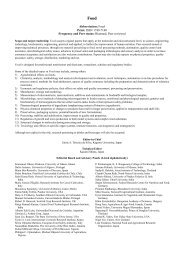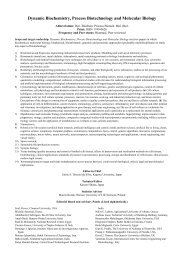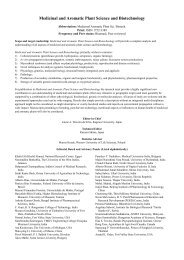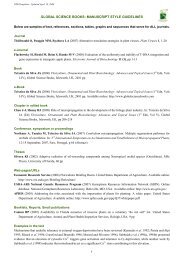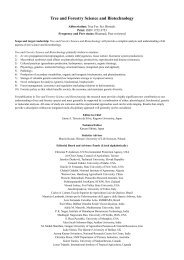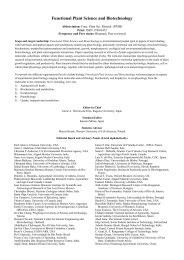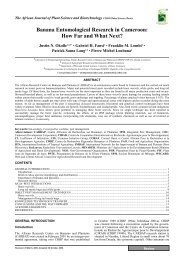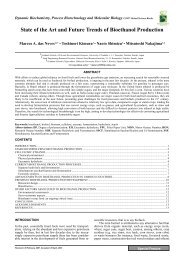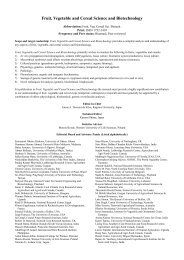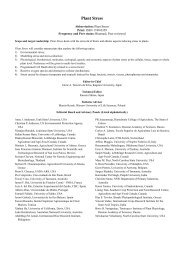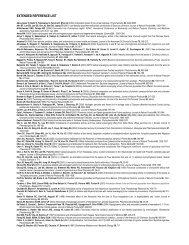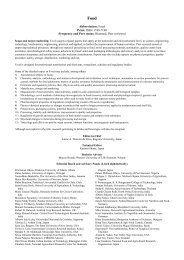Functional Plant Science and Biotechnology - Global Science Books
Functional Plant Science and Biotechnology - Global Science Books
Functional Plant Science and Biotechnology - Global Science Books
You also want an ePaper? Increase the reach of your titles
YUMPU automatically turns print PDFs into web optimized ePapers that Google loves.
Mejda Daami-Remadi, Hayfa Jabnoun-Khiareddine, Fakher Ayed, Mohamed El Mahjoub (Tunisia) Comparative<br />
Aggressiveness of Verticillium dahliae, V. albo-atrum <strong>and</strong> V. tricorpus on Potato as Measured by their Effects on Wilt Severity,<br />
<strong>Plant</strong> Growth <strong>and</strong> Subsequent Yield Loss (pp 1-8)<br />
ABSTRACT<br />
Original Research Paper: Verticillium wilt is among the most serious diseases of potato in Tunisia. Three Verticillium species<br />
are involved in potato vascular wilt symptoms. The present study evaluated the pathogenic abilities of different Verticillium spp.<br />
isolates on the basis of their effects on wilt severity, plant growth <strong>and</strong> subsequent yield loss. Artificial inoculation of potato cv.<br />
‘Spunta’ plants showed, 60 days post-inoculation (DPI), that all the Verticillium spp. isolates adversely affected the inoculated<br />
plants compared to the uninoculated control. A high degree of pathogenic variability among Verticillium spp. isolates, <strong>and</strong><br />
especially those of V. dahliae was detected, according to their differential ability to cause wilt <strong>and</strong> browning of the vascular<br />
system together with a reduction in plant height, aerial part weight <strong>and</strong> tuber yield. Although, V. dahliae isolates were the most<br />
aggressive on potato plants, some V. albo-atrum <strong>and</strong> V. tricorpus isolates were found to be as aggressive as some V. dahliae<br />
isolates, according to our experiment conditions. All three Verticillium spp. seem to contribute, to variable degrees, to the potato<br />
Verticillium wilt complex in Tunisia. To our knowledge this is the first report of V. albo-atrum <strong>and</strong> V. tricorpus with comparable<br />
aggressiveness as some V. dahliae isolates on potato in Tunisia.<br />
Ashwani Sharma, Ranga Rao Ambati, Dayan<strong>and</strong>a Ch<strong>and</strong>rappa, Sarada Ravi, Ravishankar Gokare Aswathanarayana<br />
(India) Botryococcus braunii, a New Elicitor for Secondary Metabolite Production in Capsicum frutescens (pp 9-13)<br />
ABSTRACT<br />
Original Research Paper: Botryococcus braunii is a green colonial microalga which is mainly used for the production of<br />
hydrocarbons, exopolysaccharides <strong>and</strong> carotenoids. The present study revealed that some of the bioactive principles that are<br />
present in the algal extracts of B. braunii influence growth parameters, pigment <strong>and</strong> secondary metabolites production in<br />
Capsicum frutescens at different levels (1, 2, 4 <strong>and</strong> 8 mg/l). Upon treatment with different B. braunii extracts seed germination,<br />
root length, shoot length <strong>and</strong> leaf length were enhanced in both light <strong>and</strong> dark conditions. A two-fold increase in germination<br />
occurred when 8 mg/l of B. braunii extract was applied, both in the light <strong>and</strong> in the dark. Similarly, a 1-1.5-fold increased in shoot<br />
<strong>and</strong> leaf length was observed with 8 mg/l of B. braunii extract, a 2-3-fold increase in chlorophyll <strong>and</strong> a 2-fold increase in<br />
carotenoid content after exposure of C. frutescens to 8 mg/l of B. braunii extract. Vanillylamine was enhanced by 1-1.5-fold,<br />
capsaicin by 2-2.5-fold <strong>and</strong> 2-fold compared to the control after 15 days of incubation with the maximum concentration of B.<br />
braunii.<br />
Anu Annamma Mammen, Joyce Sud<strong>and</strong>ara Priya, Cordilea Hannah (India) Genotoxic Effect of Furazolidone, an<br />
Anti-diarrhoeal Drug on the Root Meristem of Allium cepa L. (pp 14-16)<br />
ABSTRACT<br />
Research Note: The present work was conducted to study the genotoxic effect of Furazolidone, an anti-diarrhoeal drug. Onion<br />
root meristems were cultured <strong>and</strong> analyzed after exposure to different time periods to the drug. There was a time-dependent<br />
decrease in mitotic indices <strong>and</strong> an increase in chromosomal anomalies compared to the control. Cell division was completely<br />
arrested after 24 hours of incubation with 0.05% Furazolidone. This study proves the genotoxic effect of Furazolidone <strong>and</strong><br />
emphasizes the prevention of the use of this drug in medicine.<br />
Proceedings papers<br />
Iyad Musallam, Mahmud Duwayri, Rida A. Shibli (Jordan) Micropropagation of Caper (Capparis spinosa L.) from Wild <strong>Plant</strong>s<br />
(pp 17-21)<br />
ABSTRACT<br />
Original Research Paper: Caper bush is grown commercially to obtain unopened flower buds (capers) used as a condiment in<br />
salads <strong>and</strong> sauces <strong>and</strong> in the manufacture of cosmetics <strong>and</strong> medicines. Capers play an important role in the food industry <strong>and</strong><br />
have become a costly <strong>and</strong> a commercially valuable product. The effect of various treatments on the behavior of in vitro<br />
consecutive micropropagation stages of Capparis spinosa was studied <strong>and</strong> a micropropagation protocol was developed. Many<br />
media were tested; Murashige <strong>and</strong> Skoog (MS) at different basal salt strengths, modified MS (½MSD) <strong>and</strong> woody plant medium



